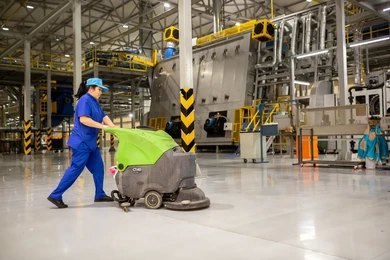
Comparing Automatic vs. Manual Cleaning Machines: Which is Better?
In the realm of cleaning technology, the debate between automatic and manual cleaning machines has gained considerable attention. Both options have their unique advantages and drawbacks, making the choice dependent on specific needs and contexts. This article delves into the intricacies of both types to help you make an informed decision.
Understanding Automatic Cleaning Machines
Automatic cleaning machines are advanced devices designed to clean surfaces with minimal human intervention. They come in various forms, including robotic vacuum cleaners, automatic floor scrubbers, and self-cleaning ovens. The primary appeal of these machines lies in their ability to perform tasks autonomously, saving time and effort for users.
Pros of Automatic Cleaning Machines
- Convenience and Time-Saving:
- Automatic machines can operate without constant supervision, allowing users to focus on other tasks or relax while the machine works.
- Efficiency:
- These machines often incorporate advanced technology, such as sensors and AI, to optimize cleaning patterns and ensure thorough coverage.
- Consistency:
- Automatic cleaners follow programmed routines, providing consistent results and reducing the variability associated with manual labor.
- Reduced Physical Strain:
- Users do not need to exert physical effort, making these machines ideal for individuals with mobility issues or busy schedules.
Cons of Automatic Cleaning Machines
- Cost:
- Initial purchase and maintenance costs for automatic cleaning machines can be high compared to manual alternatives.
- Complexity:
- Operating and maintaining these machines may require a learning curve and technical knowledge.
- Dependence on Technology:
- Malfunctions or technical issues can disrupt cleaning schedules, and repairs may be costly and time-consuming.
- Limited Customization:
- While advanced, these machines might not adapt well to unique or unexpected cleaning challenges.
Exploring Manual Cleaning Machines
Manual cleaning machines include traditional tools like mops, brooms, vacuum cleaners, and hand scrubbers. These require direct human control and effort to operate but offer certain advantages that automatic machines might not provide.
Pros of Manual Cleaning Machines
- Affordability:
- Generally, manual cleaning tools are more cost-effective, with lower upfront and maintenance costs.
- Control and Flexibility:
- Users can adapt to changing cleaning needs and directly address specific areas that require attention.
- Simplicity:
- Manual machines are typically easier to use and maintain, with fewer technical issues and complications.
- Immediate Feedback:
- Users can instantly see and correct areas that need more cleaning, ensuring a thorough job.
Cons of Manual Cleaning Machines
- Time-Consuming:
- Manual cleaning requires significant time and effort, which can be a disadvantage for busy individuals or large spaces.
- Physical Strain:
- Extended use of manual tools can lead to fatigue and physical strain, particularly for older individuals or those with health conditions.
- Inconsistency:
- The quality of cleaning can vary based on the user’s skill, energy levels, and attention to detail.
- Labor-Intensive:
- Large areas or commercial spaces may require significant human resources, making manual cleaning less practical.
Making the Right Choice
Choosing between automatic and manual cleaning machines depends on several factors:
- Budget:
- For those with higher budgets and a preference for convenience, automatic machines may be worth the investment. Conversely, manual tools are suitable for budget-conscious individuals.
- Space Size and Type:
- Automatic machines excel in large, open areas with regular cleaning needs, while manual tools are effective for smaller spaces or specific tasks.
- User Preferences and Needs:
- Consider personal or organizational preferences, such as the desire for hands-free operation versus the need for precise, customizable cleaning.
- Maintenance and Technical Capability:
- Evaluate the willingness and ability to handle potential technical issues with automatic machines versus the straightforward maintenance of manual tools.
- Environmental Considerations:
- Automatic machines may consume more power, while manual methods are generally more eco-friendly.
Conclusion
Both automatic and manual cleaning machines have their distinct advantages and limitations. The decision ultimately hinges on individual requirements, preferences, and circumstances. By assessing the specific needs of your cleaning tasks, you can choose the option that offers the best balance of efficiency, cost, and convenience. Whether you opt for the cutting-edge technology of automatic cleaners or the tried-and-true reliability of manual tools, a clean and well-maintained space is within reach.







